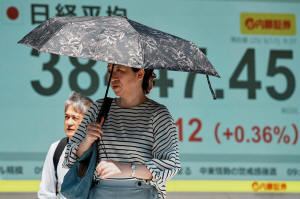Shares slide and crude oil gain more than $1 as Israel warns people in
Iran's capital to evacuate
[June 17, 2025] By
ELAINE KURTENBACH
BANGKOK (AP) ó Share prices skidded in Europe and Asia on Tuesday after
Israelís military issued an evacuation warning to 330,000 people in
Iranís capital Tehran. U.S. futures also declined.
Oil prices gained more than $1 a barrel after the warning for a part of
the city of 9.5 million that houses Iran's state TV and police
headquarters and three large hospitals, including one owned by the
country's paramilitary Revolutionary Guard.
The evacuation warning was for a part of Tehran that houses the
countryís state TV and police headquarters and three large hospitals,
including one owned by Iranís paramilitary Revolutionary Guard. U.S.
President Donald Trump announced he was returning from the G7 summit in
Canada a day early due to the intensifying conflict.
The futures for the S&P 500 and the Dow Jones Industrial Average were
down 0.6%.
In early European trading, Germany's DAX sank 1.3% to 23,380.79, while
the CAC 40 in Paris dropped 0.9% to 7,669.44. Britain's FTSE 100 gave up
0.5% to 8,833.00.
In Asia, Tokyo's Nikkei 225 index climbed 0.6% to 38,536.74 as the
Japanese central bank opted to keep its key interest rate unchanged at
0.5%.
The Bank of Japan has been gradually raising its rate from near zero and
cutting back on its purchases of Japanese government bonds and other
assets to help counter inflation. It said economic growth was likely to
moderate and there was some weakness in consumer sentiment, housing
investment.

ďIn particular, it is extremely uncertain how trade and policies in each
jurisdiction will evolve and how overseas activity and prices will react
to them,Ē the BOJ's statement said.
Chinese shares edged lower. In Hong Kong, the Hang Seng shed 0.3% to
23,980.30. The Shanghai Composite index was barely changed at 3,387.40.
In South Korea, the Kospi gained 0.1% to 2,950.30.
Australia's S&P/ASX 500 gave up 0.1% to 8,541.30. Taiwan's Taiex gained
0.7% and in Bangkok the SET was little changed.
As Israel and Iran attack each other the fear remains that a wider war
could constrict the flow of Iranís oil to its customers. That in turn
could raise gasoline prices worldwide and keep them high, though spikes
in prices from previous conflicts have been brief.
[to top of second column] |

People walk in front of an electronic stock board showing Japan's
Nikkei index at a securities firm Tuesday, June 17, 2025, in Tokyo.
(AP Photo/Eugene Hoshiko)
 Crude jumped 7% late last week after
Israelís attack on Iranian nuclear and military targets. Early
Tuesday, U.S. benchmark crude oil gained $1.05 to $72.82 per barrel,
while Brent crude, the international standard, was up $1.13 at
$74.34 per barrel.
The mood was calm Monday on Wall Street, as the S&P 500 climbed 0.9%
to reclaim most of its drop from Friday. The Dow industrials added
0.8% and the Nasdaq composite gained 1.5%.
U.S. Steel rose 5.1% after Trump signed an executive order on Friday
paving the way for an investment in the company by Japanís Nippon
Steel. Trump would have unique influence over the operations of U.S.
Steel under the terms of the deal.
The price of gold receded after jumping on Friday, when investors
were looking for someplace safe to park their cash. An ounce of gold
fell $18.40 to $3,398.70 per ounce.
Investors have other concerns, key among them Trumpís tariffs, which
still threaten to slow the U.S. economy and raise inflation if
Washington doesnít win trade deals with other countries.
The specter of those tariffs was looming over the meeting of the
Group of Seven meeting of major economies in Canada.
Later this week, the Federal Reserve is set to discuss whether to
lower or raise interest rates, with the decision due on Wednesday.
The nearly unanimous expectation among traders and economists is
that the Fed will stand pat.
The Federal Reserve has hesitated to lower interest rates after one
cut late last year. It is waiting to see how much Trumpís tariffs
will hurt the economy and raise inflation, which has remained tame
recently, and is near the Fedís 2% target.
More important for financial markets are forecasts for where Fed
officials they see the economy and interest rates heading in
upcoming years.
In other dealings early Tuesday, the U.S. dollar rose to 144.80
Japanese yen from 144.75 yen. The euro fell to $1.1557 from $1.1562.
All contents © copyright 2025 Associated Press. All rights reserved |